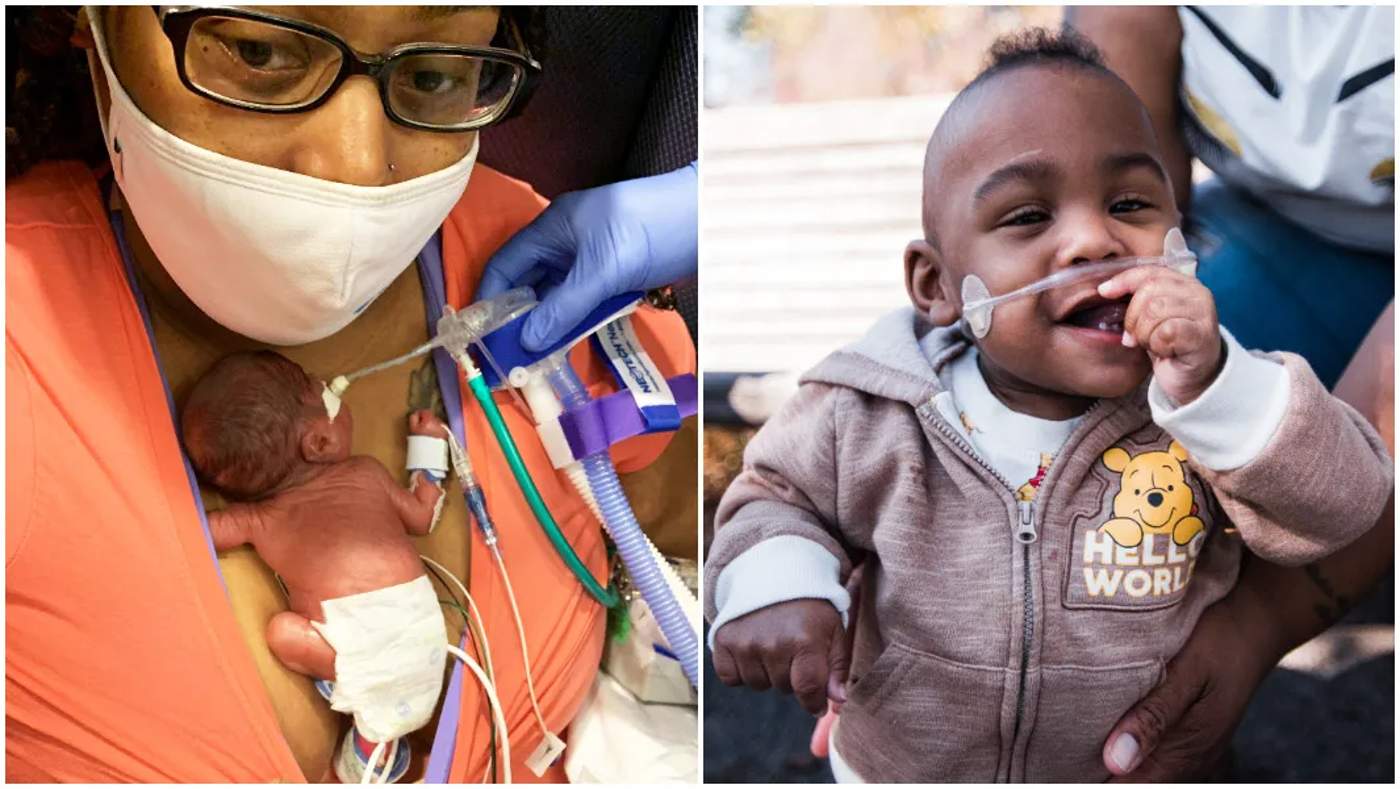This article has been reprinted with permission from Guinness World Records
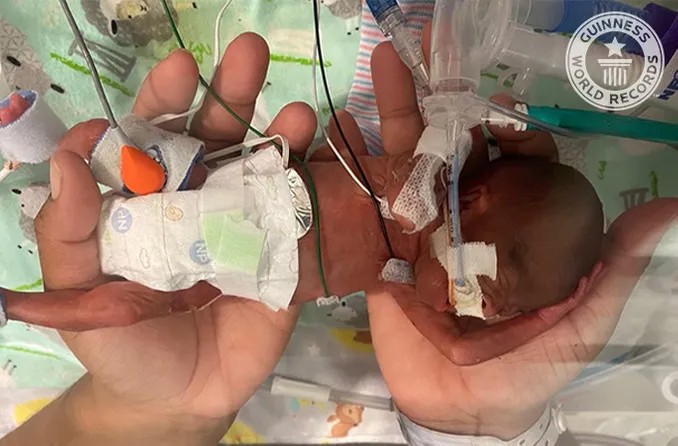
Born in July 2020, exactly one month after the previous world’s most premature baby, Curtis Zy-Keith Means from Alabama, USA, would go on to make history.
Initially, Michelle “Chelly” Butler’s pregnancy seemed to be progressing well and on track to go to full term. But on 4 July 2020, she had to be rushed into hospital for emergency surgery.
She was quickly transferred from her local hospital to the University of Alabama at Birmingham (UAB), which is heralded for having one of the leading neonatology and paediatric departments in the country.
Thanks to the quick response of the experienced medical team at the Regional Neonatal Intensive Care Unit (RNICU), following his mother’s wishes, Curtis was delivered at a gestational age of 21 weeks 1 day (148 days) at around 1 p.m. on 5 July.
His original due date had been 11 November. A full-term pregnancy is typically 40 weeks, or 280 days, making Curtis 132 days—almost 19 weeks—premature.
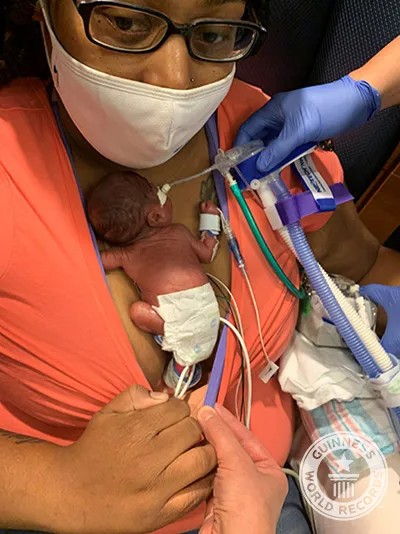
As a newborn, Curtis weighed only 420 g (14.8 oz), which is about the same as a soccer ball.
“The medical staff told me that they don’t normally keep babies at that age,” Chelly told Guinness World Records in an exclusive interview. “It was very stressful.”
To everyone’s amazement, Curtis responded extraordinarily well to treatment and, as the days and weeks went on, he grew stronger and stronger.
That said, there were many challenges along the way and he required around-the-clock care for many months.
This incredible story of joy and beating the odds is tempered with heartache because Curtis was one of twins.
Also delivered at 21 weeks 1 day, his sister—C’Asya Means—was less developed and did not respond to the treatment in the way her brother did. Tragically, she passed away just a day after birth.
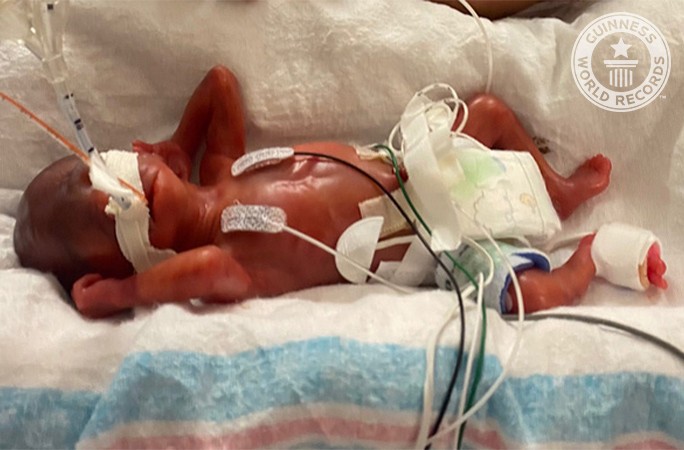
For the vast majority of preterm babies born this early on, the chances of a long-term future are vanishingly slim. This is what makes Curtis’ recovery all the more exceptional.
Dr Brian Sims, the neonatologist on duty who oversaw the twins’ delivery and who was greatly involved with Curtis’ subsequent treatment, told us, “The numbers say that babies at this age will not survive. Mom’s question to me was: ‘Can we give my babies a chance?'”
LOOK: First Neonatal Wearable Could Provide Real-time Detection of Jaundice and Vital Signs
After 275 days (about nine months) of being looked after by a huge team at the RNICU and the wider Women and Infants Center, it was determined that Curtis was fit enough to go home on 6 April 2021.
His discharge from the hospital was only made possible with a tailored course of medication and special equipment such as bottled oxygen and a feeding tube, but it was nevertheless a major milestone on his extraordinary journey.
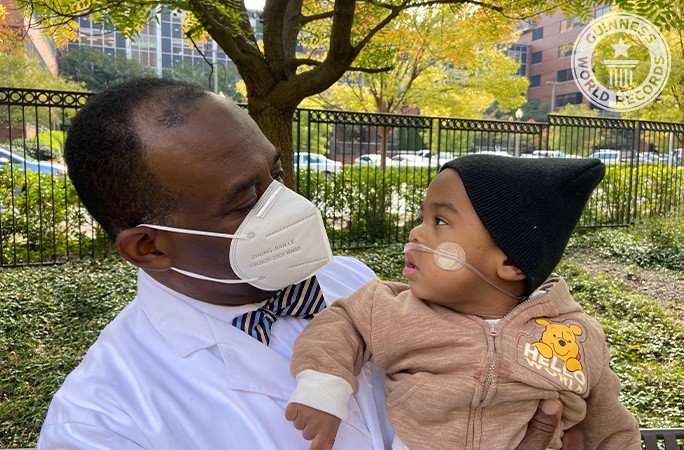
Curtis, or “Poodie” as his family also call him, celebrated his first birthday on 5 July 2021. At this point he qualified as the most premature baby to survive.
He has three siblings, the eldest of which love to help out with day-to-day care such as bathtime, getting dressed and feeding.
“He’s very active. I’m tired already!” Chelly told us with a grin when asked about her son’s energy levels.
“I’m very proud of him because where he came from and where he at now, I can tell the difference.
READ: Research Shows Babies Are Relaxed By Lullabies Even in Foreign Languages: The Frère Jacques Response
“Having this record is a blessing that he has accomplished and I’m thankful that [Guinness World Records] accepted him.”
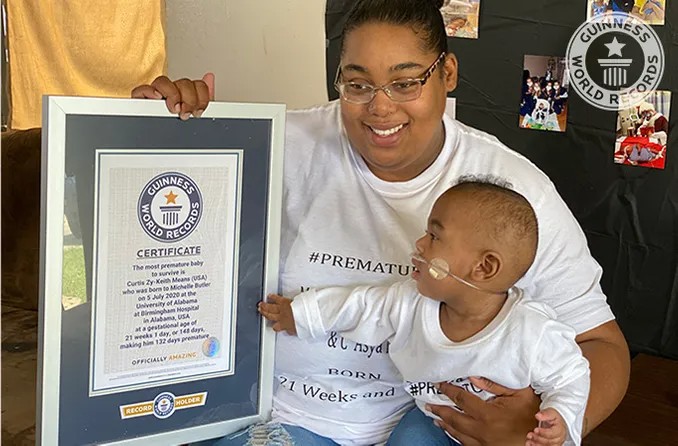
Now in November—which is aptly Prematurity Awareness Month—Curtis is about to see in what would have been his first birthday (11 November) had he gone to full term.
Of course, setting records was the last thing on the mind of his mother and the doctors at the time of his delivery.
At that point, it was all about getting through those extremely challenging first minutes, hours and days.
CHECK OUT: ‘Mind-blowing’ Surgery in Mothers’ Wombs Spared Dozens of Babies From Spina Bifida Paralysis
“He showed initially that he responded to oxygen, his heart rate went up, his numbers went up…” Dr Sims informed us.
“He was giving us a lot of positive feedback that… he wanted to survive.”
From the very beginning, Dr Sims was astounded by Curtis’ resilience. “I’ve been doing this almost 20 years… but I’ve never seen a baby this young be as strong as he was… There was something special about Curtis.”
(WATCH the video for this story below.)
SHARE This Story of Defying the Odds With Friends…




















